Last week’s omnibus spending bill approved by Congress contains a lot of items for sure, and on page 137 it says this:
Granted, most astute and knowledgeable observers of island politics think that these few lines are a a good sign to finally resolve Puerto Rico’s perpetual political limbo status with the United States, a territorial relationship that began when U.S. troops landed on the island’s southern coast in July of 1898. This line item puts federal dollars into a plebiscite process for the first time, signifying that the U.S. would finally have some skin in this game, a game they have Congress has ignored for decades. With about 3.8 million American citizens living on the island and another 4 million Puerto Ricans living on the mainland, it is the duty of Congress to finally wake up and move on this issue. The dollar amounts aren’t big, but it would cause the Department of Justice to get involved in a process, and it could be the sign that such a process would be binding and permanent.
Nonetheless, don’t tell that to the Heritage Foundation. In a sweeping summary of points that lambasted the bill, here is what Hans von Spakovsky, Heritage’s Senior Legal Fellow wrote:
Another foolish waste of taxpayer money is $2.5 million for the State Elections Commission of Puerto Rico to conduct “objective, nonpartisan voter education about, and a plebiscite on, options that would resolve Puerto Rico’s future political status.” But Puerto Rico already held a vote on that issue in 2012. Residents pretty much split on the question of whether they wanted to stay a territory or change their political status. There is no reason for the American taxpayers to spend any money on another plebiscite – if the Puerto Rican government wants to do so, why doesn’t it do it on its own dime?
von Spakovsky’s comments just reflect what most Americans feel about Puerto Rico: indifference and ignorance. His analysis is not only insulting to American citizens who lack equal rights or the right to FINALLY resolve its political status after 116 years, it also clearly misses the point: Puerto Ricans have been trying to do it “on its own dime” for years, but the irony is that 1) The U.S. has never paid attention until this right now and 2) Puerto Rico is inherently tied to the United States, especially on an economic level. von Spakovsky clearly doesn’t understand that if the U.S. doesn’t push Puerto Rico out of its status quo system (which a majority of Puerto Ricans favor), it will only get more and more costly for the U.S. to maintain such a system.
Yet instead, Heritage and von Spakovsky would rather perpetuate the image of the backward image of the world’s oldest colony. Here is what Heritage is saying: This isn’t our problem.
It actually is your problem, too. Once all Americans realize that, then we can finally address this issue.





The Gnostics derived their http://633cash.com/Games leading doctrines and ideas from Plato and Philo, the Zend-avesta, the Kabbalah, and the Sacred books of India and Egypt; and http://633cash.com/Pengaturan” thus introduced http://633cash.com/Daftar into the bosom of Christianity the cosmological and theosophical speculations, which had formed the larger portion of the ancient religions of the Orient, http://www.cintaberita.com joined to those of the Egyptian, Greek, http://633cash.com/Promo and Jewish doctrines, which the Neo-Platonists had equally adopted in the Occident..It is admitted that the cradle http://633cash.com/Deposit of http://633cash.com/Withdraw Gnosticism is probably to be looked for in Syria http://633cash.com/Berita and even in Palestine. Most of its expounders wrote in that corrupted form of the Greek used by the Hellenistic Jews…and there was a striking http://633cash.com/Girl analogy between their doctrines and those of the Judeo-Egyptian Philo of Alexandria; itself the seat of three schools, at once philosophic and religious, the http://633cash.com/LivescoreGreek, the Egyptian, and the Jewish. Pythagoras and Plato, the most mystical of the Grecian philosophers (the latter heir to the doctrines of the former), and who had travelled, the latter in Egypt, and the former in Phoenicia, India, and Persia, also taught the esoteric doctrine…The dominant doctrines of Plutonism were found in Gnosticism